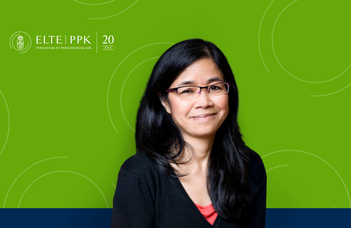Why intercultural studies are crucial for pedagogy and psychology

What three words come to your mind when you think about PPK?
Student-friendly. Great community. Belonging.
Within ELTE PPK, what is the Institute of Intercultural Psychology and Education concerned with exactly?
We are primarily addressing such sensitive yet inevitable topics as intercultural and multicultural education, encounters between different cultures, and gender issues. We have students coming from diverse cultures and locations. Besides, the world is in a state of constant change: each year, we need to redefine the intercultural psychological and pedagogical guidelines along which we design and develop the content of our programme and our research. Just an example: Previously, no one had ever started their studies with working experience in a refugee camp. A situation like this requires serious professional preparation and an added level of sensitivity on our part. It is also a great responsibility that there exists no programme in the form that we are currently offering it in either Hungary or elsewhere.
What makes the Social Integration MA studies so special?
There are very few people today who do not encounter cultural and sociocultural diversity in one form or another in their family, at their workplace or in school. These encounters present a lot of opportunities but also have the potential for conflict. The main question is: how can we successfully solve these conflicts while exploiting the good opportunities? We are looking for answers to such questions with the students of this programme who, by the end of their studies, will have acquired the necessary intercultural, psychological, pedagogical and other social scientific skills to be able to successfully manage the encounters between people of different cultural backgrounds.
This is where equal opportunities and social justice enter the picture. We put extra focus on guiding our students towards a perspective where equality and reducing prejudices play important roles. The programme is available in English and we have several international students as well, so our students already experience a type of “intercultural encounter” during their studies.
What prospects do graduates have in terms of both employment and further studies?
Graduates from the programme often find employment as intercultural professionals or social integration counsellors where they completed their fieldwork, or they pursue a career as per their previous qualification (such as communication experts, psychologists, special education teachers, social workers, teachers or diversity experts at certain companies or schools), with a greater focus on approaching their job from an intercultural perspective. Some of our students have gone to international organisations such as UNESCO. Many are employed at the international departments of different universities. We have already provided ELTE as well with social integration professionals. We are glad to see that the masters programme offered by our Institute represents an important milestone for our students, who often consider their two-year studies here as a great influence on their career path. Many of them have found a successful career establishing social enterprises and associations, such as Consciously Good (winner of the Social Impact Award in 2023) and the Kacsakő Association.
Although our programme is “small”, a great percentage of our masters students continue their studies on the doctoral level. We already have colleagues who completed their doctoral studies right after graduating from the masters programme.
As a matter of fact, even more opportunities are open from this academic year: besides our module that has been included in the curriculum of the Doctoral School of Psychology for a long time, we have launched a new Culture, diversity and education doctoral programme at the Doctoral School of Education.
For more information about the masters programme, please visit this webpage.

